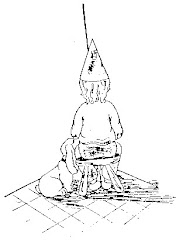There isn't one. Not officially. However, I remember giving the book to a co-worker a few years back. She liked to read fantasy, and she was very intelligent, so when she expressed an interest in reading what I had written I told her I would be pleased to hear what she had to say about it.
She only came back with two comments. The first was I had a tendency to shift the Point of View (POV). I thought I had corrected that, but I even got called on it from the Minions when I submitted my first 300 words to Evil Editor (http://evileditor.blogspot.com). The second was that it was "too religious" for her to get into. I argued that it wasn't relgious at all, but she wouldn't accept it.
I felt bad because she wasn't going to read it again or give me any more help, but I wasn't going to change the story just because she thought it was religious. For one thing, I still didn't think it was. I certainly had no conscious intent, anyway.
Afterward, I tried to figure out why she thought the book was religous. (She didn't want to talk about it.) My only conclusions - right or wrong, I'll never know - were my references to the High King, and that The Great Sea as a created place (suggesting God). Oh, and I supposed she thought Zenophone was Satan. I don't know who she thought was Jesus Christ. There is no Christ figure in the book. None of my characters are without fault, much less sinless. Characters may sacrifice themselves for other characters, but that is true on both sides of the fight. The Barbarians are as likely to sacrifice themselves for their comrades as anyone in Khirsha's family. The point of the book is not about getting to heaven, or being reconciled with the High King. It is about the struggle for control of a place, called The Great Sea. To me, it's not religous.
I think the problem was that Jenni didn't like it that 'religion' was against some things which were part of her lifestyle, and so she was ever alert to defend herself against charges of sin. I didn't put any of that in the book. The book isn't about telling people what's right and what's wrong, or what they should think or believe. When I was young I tried to write like that, but all of that writing was contrived crap. As I have aged I have come to realize nobody has charged me with the task of making anyone believe anything. Those are not the gifts I was given at birth. What I am good at, and what I enjoy doing, is telling stories. That's what Swords of Fire is: a story. And I want the characters to seem real, so every character has both admirable - and not so admirable - traits.
Swords of Fire is not some kind of cheap instruction manual on morality. (You won't get through Book I before you realize my main characters are far from being Champions of Morality.) It is history. It is what happened at a place called, The Great Sea. No brow beating intended. I promise. But I couldn't make Jenni understand that.
All the same, I now believe I was wrong to argue with Jenni about what she got from my book. It is my feeling that when a reader reads a story, it becomes theirs, and they are a free to take from it whatever they wish. I denied Jenni that right, and maybe that's more why she was finished with the book. We were still friends. We talked and laughed about other things, confiding what co-workers confide. But we couldn't talk about the book anymore.
That I have 'religious' (I hate that word) convictions is no surprise. Most people have them. Even believing there is no God is a religious conviction, I think. And I guess it is only a matter of course that what I believe works its way into what I write - particularly as regards fiction. My concepts of good and bad show in some of the family laws/edicts. Most of what I believe to be 'good' and most of what I believe to be 'bad' is shared by most of the people who share my culture. In Swords of Fire, even the so-called 'good' cultures adhere to rules and behavior I do not consider good in my own culture. The same is true for bad. So either I'm a hyprocrite, or I'm not so solid in my convictions as I believe, or it doesn't matter at all because Swords of Fire is just a story. It's a safe exploration of other ways of thinking. I don't know. I think that's too deep for me.
So here's the short answer: Swords of Fire is a story. Take from it what you will. I do hope you enjoy it. That, I did intend.
Sunday, December 21, 2008
Subscribe to:
Post Comments (Atom)
Today's Music
Yeah. That's The Great Sea all right.







No comments:
Post a Comment